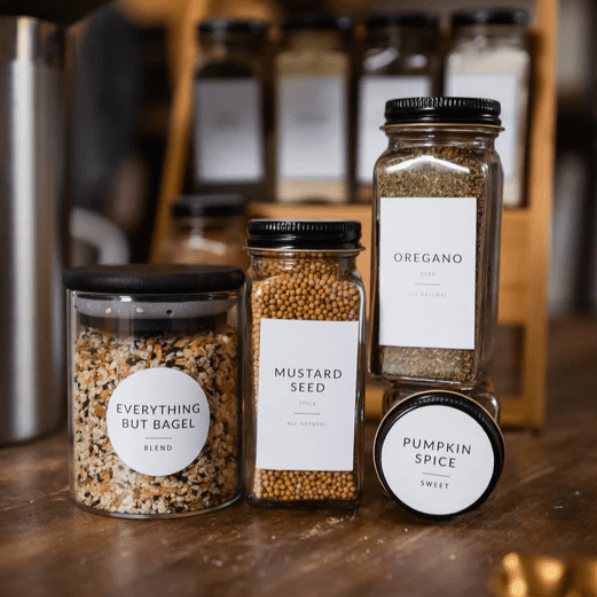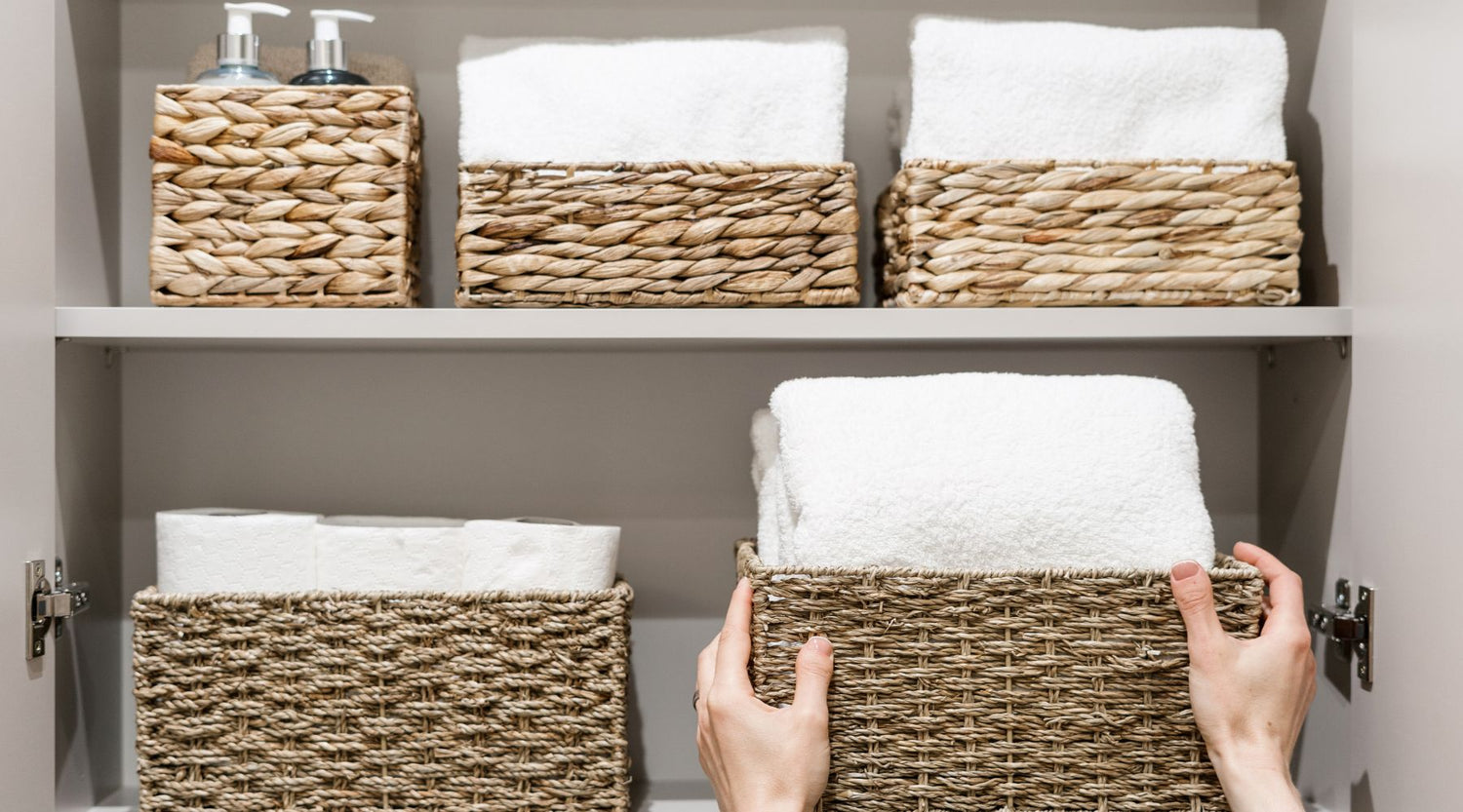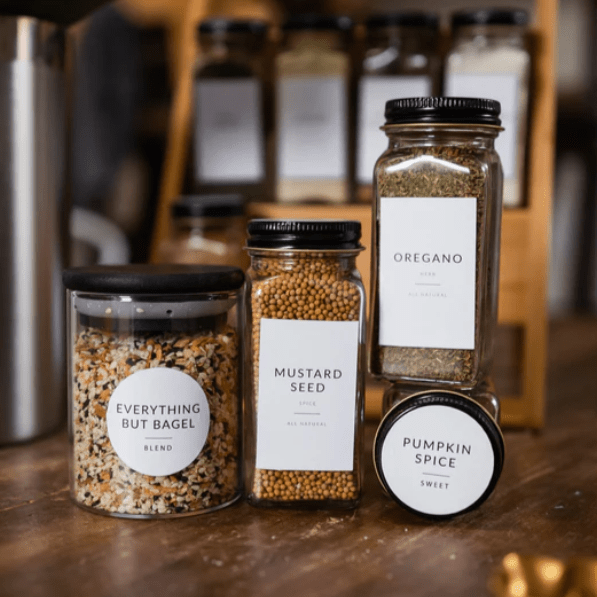Dried herbs lose their freshness and potency over time. Label and organize our herbs so you can use ingredients in a timely manner.
Quick links:
Check out our collection of spice labels and choose a set that best suits your style!
We cover the benefits of labeling your herbs, as well as offer some useful organization tips.
Track freshness
The purchase date and first opening date allow you to track the potency and freshness of dried herbs. Many cooks do not realize spices start to deteriorate when they are exposed to air and humidity. Flavors and aromas can fade quickly.
Track freshness with labels by marking the month and year purchased. When you open your herbs for the first time, note the date on your label. Check these two dates as you cook to determine freshness and use up herbs before they go stale.
Make it a habit to check label dates and use the oldest viable herbs first. That way, you make use of your herbs while they are still strong and fragrant, and also reduce waste.
Easily locate ingredients
A proper labeling system for your herbs allows you to easily identify and locate the exact ingredients you need, which saves you time in the kitchen and makes cooking less of a chore.
Prober labels will avoid shuffling through messy cabinets and baskets to locate the oregano or choose between multiple dried basil containers.
Labels also clearly designate where herbal supplements or medicines are stored, allowing quick access in times of need. A good labeling system for your herbs will help you make quick and informed choices.
With a reliable labeling system for your herbs, you’ll easily find the right ingredients for recipes, remedies, beauty products, dietary supplements, or herbal medicines in a second.
Prevent duplicate purchases
A clearly labeled herb storage system gives you full visibility of what is already on hand. This visibility makes unintentionally buying duplicates less likely on your next trip to the store.
Before an outing, check your current stock of dried herbs, fresh herbs, herbal teas, tinctures, capsules, essential oils, salves, and any other herbal products. Make note of any items that are empty or running low.
For example, take a quick peek to see if you have enough oregano and thyme for Italian cooking this week or sufficient calendula flowers for a new lotion. Make a list of specific herbs and proprietary herbal blend products requiring replenishment.
This simple step of consulting your labeled herb collection saves money that would otherwise be wasted by purchasing duplicate ingredients. It also ensures you always have the right herbs on hand. Keep your kitchen fully stocked without the unneeded extras!
Avoid expired herbs
A good labeling system also includes expiration or best-used-by dates. This allows you to quickly scan your herb collection and locate any older ingredients that should be used up in your next herbal remedy or skin care recipe. Proper date markings prevent waste and ensure you are using herbs that are still viable. Nobody wants to cook with expired herbs and end up with a boring, bland dish!
Visibility of expiration dates enables efficient rotation of herb stock so you use up older items before they are past their prime. Proper labels will help you get rid of expired herbs and remember to restock with a fresh batch.
Get our expiration labels to keep your herb collection fresh and organized!
See what needs to be restocked
A labeled herb collection allows for easy inventory checks to see which items you need to restock.
For example, scan your spice drawer for any dried culinary herbs running low, like basil, oregano, and cilantro. Check your herbal tea stash to see if soothing blends such as chamomile, peppermint, and ginger need replenishing.
Proper labels will help you keep track of your herbs and make your grocery runs that much easier. No more discovering empty containers when you need an ingredient for that delicious dinner or soothing herbal remedy.
Get a uniform, organized look
A reliable labeling system brings visual harmony to your herb collection. When stored in matching glass spice jars and adorned with our pre-printed sunshine spice labels, your herb collection will take on another level of aesthetic appeal.
Consistent, professional-looking labels transform a once chaotic cabinet stuffed with plastic bags and difficult-to-distinguish containers into a showcase of organization. Clear glass jars neatly display contents while keeping air and light exposure to a minimum. Neat labels provide ingredient names and other important information.
Save money
A properly labeled herb collection doesn’t just save you time, it saves you money too. When you can clearly see which herbs you already have on hand, you avoid unintentionally buying more before using what you have. Why buy more oregano when you already have three full jars stashed away?
Plan weekly recipes and around what you already have to cut costs. Get creative with the elderberries, dandelion roots, and other herbs in your collection before purchasing anything new.
Consider growing your own herbs at home to cut costs further. Develop your green thumb and save money at the same time!
Benefits of labeling herbs FAQ
What are the positive effects of labeling?
The positive effects of labeling include the following benefits:
- Enhanced accessibility
- Minimized spoilage
- Optimized buying habits
- Organization
- Improved aesthetics
- Reduced frustration within shared spaces
How do you label herbal tinctures?
Label herbal tinctures directly on the glass bottle with a permanent marker or adhesive label. Tincture bottles are often dark colored, so our white labels are a great choice as they will stand out and be easy to read. List ingredients and amounts, suggested use, date made, expiration date, storage information, producer details, consumption warnings, and any other important information.
How do you label herbal products?
You can label herbal products such as tinctures, salves, and tea blends by using our black labels, tags with string, or permanent markers directly on glass bottles and containers. Include the product name, all ingredients with amounts, the date made, expiration date, storage information, directions for use, and the producer/company name with contact details.
Can I sell my homemade herbal products?
Yes, you can legally sell nontoxic herbal products you make at home such as teas, herbal vinegars, tinctures, salves, and more depending on your state's cottage food laws. Research your state's specific homemade goods regulations. Display required details clearly on your product labels like the ingredient list, net weight, production date, name, and address.
Should herbal skin care recipes for sensitive skin contain food additives?
While food additives allow homemade skin care recipes and beauty products to last longer, natural recipes without these extra ingredients are gentler for sensitive skin.
What sunlight conditions are best for growing excellent herbs?
The level of direct sunlight herbs need varies depending on the plant. While Mediterranean natives like rosemary, oregano, and thyme require full sun exposure for ideal health and flavor, more delicate herbs such as parsley, chives, and mint thrive better with just 4-6 hours of indirect sunlight per day filtered by other plants.
What are the labeling requirements for herbal supplements?
Herbal supplements must follow the FDA’s detailed labeling standards:
- Supplement facts box with servings, amounts, and daily values
- Other ingredients
- Suggested use
- Supplement name
- Mandatory warning text
- Contact details
Work with a reputable manufacturer to meet regulations and properly vet ingredients for safety, purity, and potency.
What are the ten most used herbs?
The 10 most popularly used herbs in the world are:
- Chamomile
- Cinnamon
- Echinacea
- Garlic
- Ginger
- Ginseng
- Milk thistle
- Turmeric
- Valerian root
- Saw palmetto
Should dietary supplements made from organic herbs have claims on their labels?
Yes, dietary supplements, even when sourced from organic herbs, should clearly display any evidence-based benefit claims on their labels alongside mandatory details such as ingredients, suggested use, etc. Responsible labeling builds consumer trust in herbal supplement quality and safety, as they are not regulated as strictly as medications.






